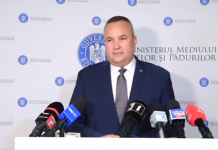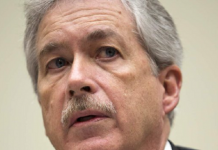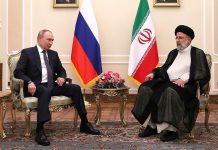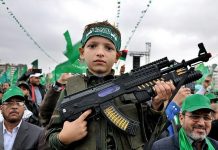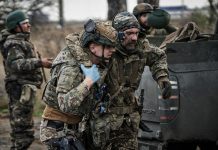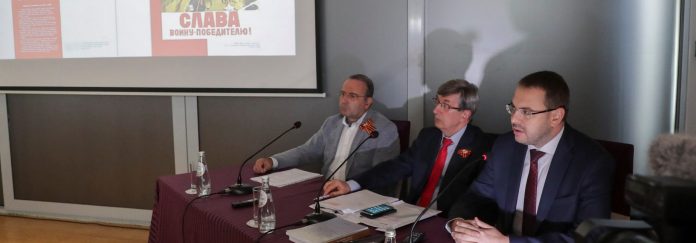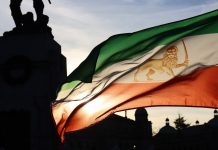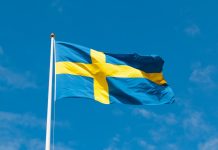Russia is carrying out an extensive campaign to rewrite the history of the Ribbentrop-Molotov Pact in the context of the 75th anniversary of what the Russians call the „war of liberation of Central and Eastern Europe from Nazism.” Romania is an important part of the Kremlin’s propaganda plant plan, and the event organized on Wednesday at the Marshal Garden Hotel in Bucharest is yet more evidence of this.
The cleansing of „impurities” of the Ribbentrop-Molotov Pact, the existential epicenter of the USSR, is part of the broader – broader to vast – obsession of the power in Moscow to beautify each and every detail of the history of the Soviet Union in the World War II, so that decisive moments can be extracted and repackaged into new political narratives that are convenient to Vladimir Putin’s agenda. Alexandru Dodan, a diplomat, has a thorough analysis of this relativistic effort of the Russians. – AICI
We are talking about a propaganda agitator to which not only the state institutions, the Russian media, historians, diplomats, lobbyists contribute, but also a real army of directors – assigned to the Mosfilm concern – led by Nikita Mihalkov and Feodor Bondarciuk. Many of their films are spectacular instruments to distort uncomfortable historical realities, applying Lenin’s famous thesis: „Film is for us the most important of the arts.”
Somewhere in this soft power constellation, the Russian Embassy in Romania is mixed up with this, and as an extension of it, the Russian Center for Science and Culture. In general, Russia’s diplomatic mission to Bucharest (fenced with barbed wire and walls of Sci-Fi fortress, as if operating in a state in the Middle East and not in a peaceful country in the EU) prefers to tiptoe in public. This of course, except in cases where the Russian ambassador Valeri Kuzmin displays his provocative qualities, as was the case of the „symbolic donation” related to the the Wisdom of the Earth.
Another example of the diplomatic sport of tiptoeing around was the scientific conference organized by the Russian Center on Wednesday, entitled „75 Years since the Liberation of Eastern Europe from Fascism and Nazism: the Lessons of History.”
Universul.net thought it would be useful to have a look at such an event.
***
The conference room is on the 6th floor, a rather cramped room, where the walls are full of framed photographs with Romanian actors: Mircea Albulescu, Mitică Popescu and so on. At around 10 am, the guests begin to arrive. In the meantime, in the public, the black-orange ribbon of St. George appears here and there pinned to the chest pocket of some people’s jackets. It’s a military symbol which gained a bad reputation after 1990, as it’s considered an emblem of post-Soviet revisionism. You can see it among the Trans-Dniester separatists. You can see it in the war in Donbas.
St. George’s ribbon
The room is enclosed with the panels of the exhibition „The Path to Victory: Historical Sources Confirm. At the 75th anniversary of Eastern Europe’s Liberation from Nazism.” Assembled at the Moscow Museum of History, a complete package of pacifist triumphalism courtesy of the Kremlin.
Students were also brought in to „fill out” the audience. They walk uneasily among the chairs. Some are rather sleepy.
Kuzmin begins his tirade
But the audience suddenly stirs when Ambassador Valeri Kuzmin appears, slightly swaying as he walks, Al Pacino style, looking above his glasses, and the waves of the Russian language begin to flow in an agitated way through the air. A massive gentlemen, who is visibly moved dressed in a shiny suit, rushes to shake the ambassador’s hand, completely forgetting he had a phone in his lap: the phone is heard crashing to the floor, and the shock can be read on the man’s face as he sees the cracks on its screen.
Valeri Kuzmin’s word of welcome begins in force, spitting a burst of verdicts, like a machine gun, against the European Union and, overall, Western liberal democracies.
The Russian ambassador considers it unfair to consider the Nazis and the Soviets equal.
Kuzmin: „To my great regret, in recent years, the impression has been created that many in modern Europe are not only simply unable, but consciously unwilling to learn and, most importantly, to guide themselves in practical politics taking the indisputable lessons of World War II. This is denoted, among all, at least by the resolution The Importance of the European Historical Memory for the Future of Europe, adopted among the first by the new European Parliament. In it, alongside the usual reference to the tragedy of the Holocaust, an unreasonable attempt is made to assign practically equal responsibility for the horrors unleashed during World War II to the two totalitarian regimes – the Nazi and the Soviet, completely ignoring the huge sacrifices and the heroic struggle against Nazism and fascism of the people of the USSR, who made a decisive contribution to the definitive victory of the anti-Hitler Coalition. But it was precisely this victory that opened the historical perspective of the peaceful and democratic development of the European continent in the second half of the twentieth century, although its history was complicated by the creation of the NATO bloc in 1949 and, in response, the Warsaw Treaty Organization only in 1955, and for a rather long period of the Cold War, unleashed by the United States and its allies.”
As if the USSR was dealing with ornithology and not with the same Cold War. „The shameful role of Western democracies in the emergence of Nazism has been overlooked, especially that of the United Kingdom.”
Kuzmin describes the USSR’s role in World War II as a reaction of a savior who could no longer bear the evil of „fascist-totalitarian regimes in Western Europe.”
„There is a unique inability in the current politics of Washington and Brussels to draw lessons from the tragedy of World War II,” claims Ambassador Kuzmin, adding that the U.S. is currently destroying the treaties between Russians and the Americans, one by one. The Russian ambassador has a separate dispute with the ABM Treaty against ballistic missiles, concluded in 1972 between the U.S. and the USSR and terminated in 2002 by George W. Bush, who argued that it hinders the development of means of defense against rogue states, such as North Korea or Iran.
Then, Valeri Kuzmin rages against the U.S, „Arms Race in Outer Space,” adding that „Trump is developing his nuclear arsenal to reach global domination.”
„Russia and China are proposing, within the UN, that agreements should be developed on the inadmissibility of being the first to deploy weapons in Outer Space, the refusal to be the first to use nuclear weapons, and the refusal of nuclear war in general. Recently, on October 10, 2019, the participants in the meeting of the Council of Ministers of Foreign Affairs of the CIS adopted the statement Supporting the practical steps to prevent the arms race in Outer Space. Our country is constantly promoting the strengthening of the central role of the UN, international law, multilateral dialogue / network diplomacy, network diplomacy, seeking answers to such global challenges and threats, such as international terrorism, adverse climate change and environmental pollution, organized cross-border crime, dangerous epidemic diseases, etc. ”
What the diplomat forgot to mention is the existence of the Russian Space Forces, which belong to the Russian Air Forces, with responsibility for the „space war”.
Moghilevski: „the Soviet Army Brought Peace”
Kuzmin gives the floor to Konstantin Moghilevski, the director of the „History of the Fatherland” Foundation, who opens the exhibition and vehemently exculpates Russia’s participation in the Ribbentrop-Molotov Pact: „The USSR signed the Hitler-Germany deal for security reasons. This reality must be carefully weighed. ”
What about the waves of deportations from Bessarabia and Northern Bukovina to Siberia and Kazahastan (generally the civil servants from the Romanian administration at the time) in cattle cars? Should these also be weighed carefully or rather turned a blind eye to?
According to Moghilevski, the urgency need to reanalyze the Ribbentrop-Molotov Pact is that „the archives of the Second World War have not been well analyzed by historians.” The Soviet occupation of Romania from 1944 to 1958 is for Moghilevsky an act that liberated Romania. „We must understand the complexity (…) We must understand that there were different expectations from the Romanians. Romania had suffered a lot because of the Hitlerites and Romanians were afraid of what the Red Army would bring.”
Therefore, director Moghilevski wants to convince the audience that the Romanians, drunk with fear, misunderstood the nature of the Soviet presence in Romania, mistaking it, alas, by pure and innocent exaggeration, for an occupation.
Mr. Moghilevski’s fervour goes even further, embellishing the historical truth with a flurry of confetti: “The Soviet army brought peace, a way of living in peace. There are movies about how the Red Army was welcomed. The liberation coincided with the change of regime in Romania, Antonescu’s regime was directed against the Romanians.”
Perhaps it would do no harm to the ethical inclinations of director Moghilevski if he were to consult a bit, when has nothing better to do, the list that one of the most courageous diplomats in Romania, Vasile Soare, our ambassador in Moscow, has drawn up since 2008. The list contains the names of as many as 10,000 Romanians „blessed” by the „peace” which the Red Army brought: 10,000 Romanians who died in the camps of the NKVD, in the „Gulag Archipelago”, between 1941 and 1956. The total number of prisoners identified so far is 29,829.




